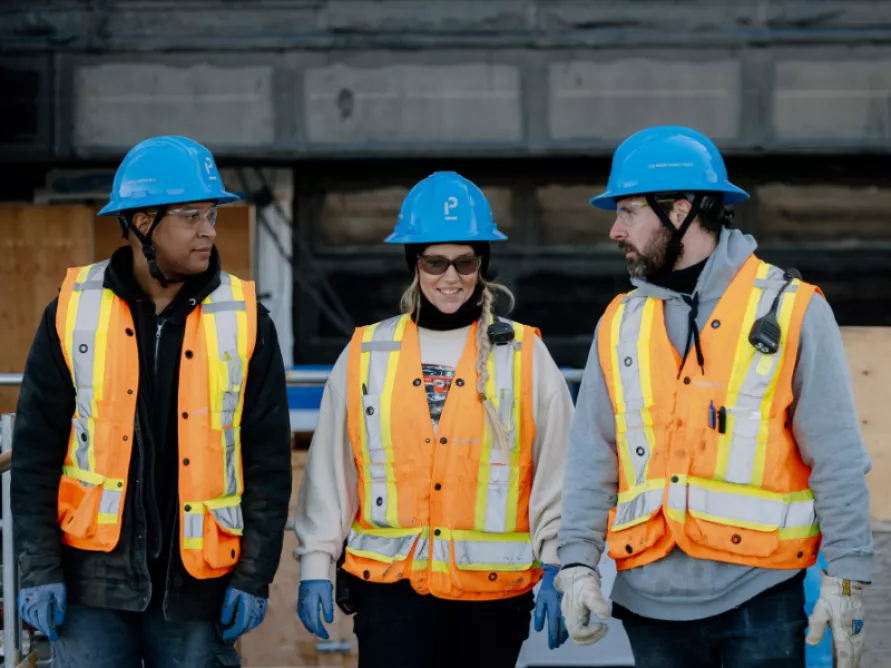Deep Foundation Solutions:
Building on Solid Ground
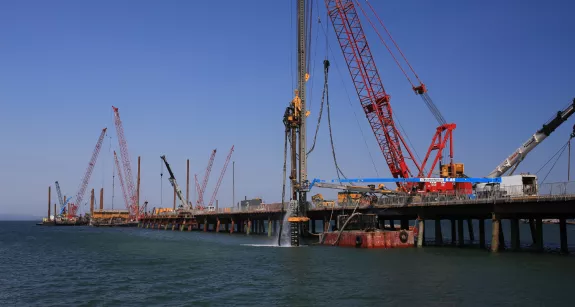
Deep foundations are essential in construction, securely anchoring structures in stronger soil layers. Since 2006, our specialized deep foundation team at Pomerleau has played a key role in the completion of complex projects through innovative solutions. With Pomerleau, you benefit from the experience and passion of a team dedicated to excellence in the construction industry.
Applications of Deep Foundations in Construction
Deep foundations are used in various construction projects to ensure the stability and safety of structures. They are particularly suitable for supporting heavy constructions such as skyscrapers, bridges, and industrial facilities. In areas with unstable soils, such as soft ground or areas with high water tables, they allow access to deeper, more stable soil layers. Deep foundations are also commonly used in marine construction for docks, jetties, and offshore platforms, as well as in industrial facilities, such as power plants and refineries, to support heavy equipment.
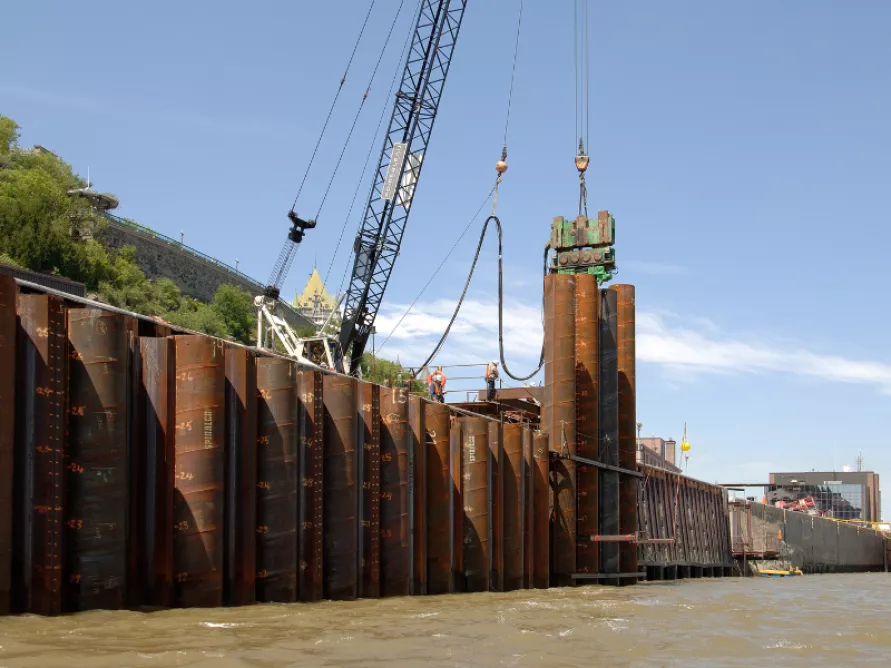
Different Types of Deep Foundation Solutions
Deep foundations encompass several types of structures, such as piles, retaining walls, and ground improvement. Each type has its own characteristics and applications, ensuring stability and strength for different construction needs. At Pomerleau, we master all of these types, using our expertise and equipment to create solid and reliable foundations for all your projects.
Box Piles
Box piles are one of the most common forms of deep foundations, often used for large-scale projects. This type of foundation is particularly suitable for bridges and large buildings, such as hospitals. The process involves deep drilling into a steel tube, followed by a reinforced concrete fill to ensure a strong and durable base.
Driven Piles
Driven piles are steel elements driven into the ground using a diesel or hydraulic hammer, or a vibratory hammer. This method is used to support a wide variety of structures, including buildings, bridges, and industrial facilities. The pile is installed until it reaches a solid substrate, ensuring the stability of the structure.
Secant Piles
Secant piles form a retaining wall composed of primary and secondary piles. This system is designed to create a waterproof barrier to retain soil and groundwater prior to excavation. It is particularly useful in environments where waterproofing and stability are paramount.
Sheet pile walls and combined walls
Sheet pile walls are frequently used for port structures or as temporary structures, such as cofferdams. In situations where sheet piles alone cannot support the loads, H-piles or round piles are inserted between them to reinforce the structure. This solution combines both flexibility and strength for a variety of applications.
Retaining Walls
Retaining walls are used to hold the soil in place during the construction of a permanent structure. A typical example is the Berlin Wall, which combines soldier piles with a timbering system between each pile. Tie-rod and reinforcing systems can be added to reinforce the structure during excavation.
Welding
Pomerleau is certified to the CSA W47.1 standard for fusion welding of steel, guaranteeing high-level expertise in the execution of welding work. This certification ensures that steel foundations are built with the utmost precision and according to the most rigorous standards. We guarantee the quality and safety of every project requiring welding.
Ground Improvements
Ground improvement involves strengthening the existing soil using compaction techniques and adding high-quality materials. This method increases the load-bearing capacity of the soil and ensures the stability of the foundations. It is particularly effective in unstable terrain or those with low natural load-bearing capacity.
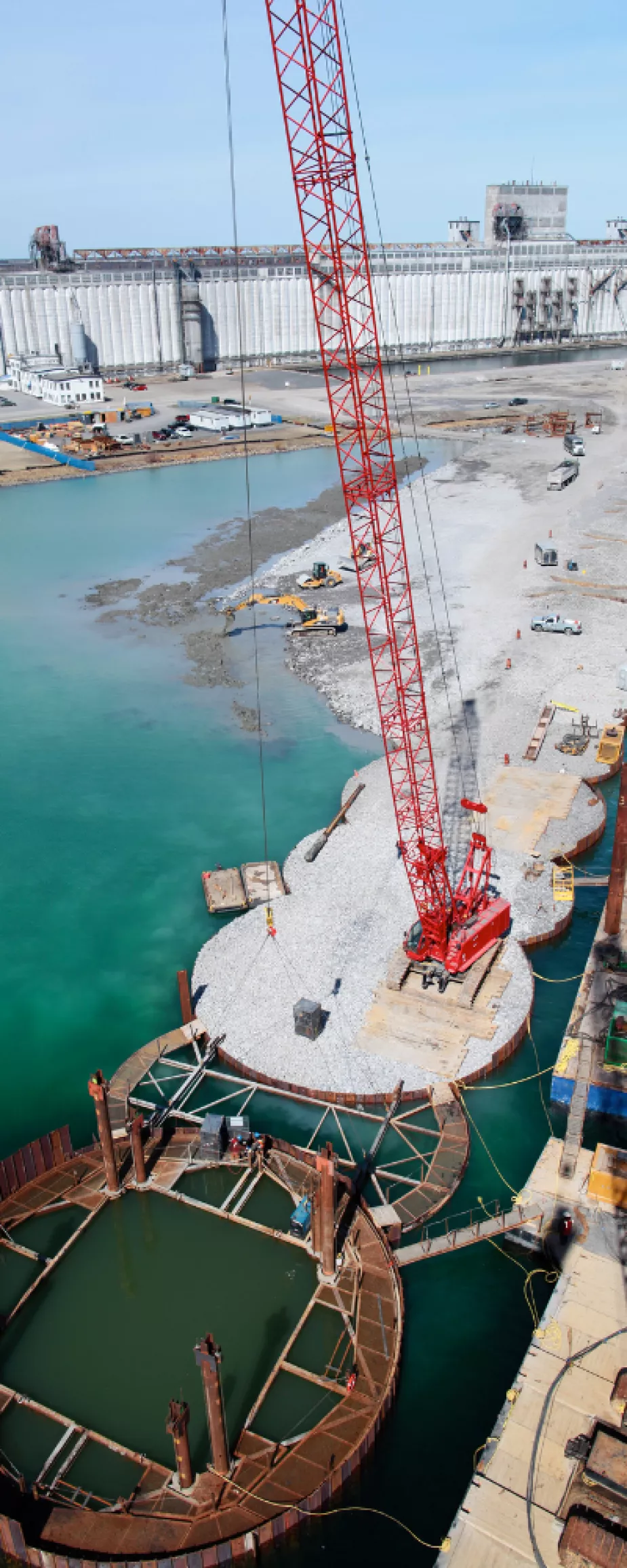
Factors to Consider When Selecting a Deep Foundation Method
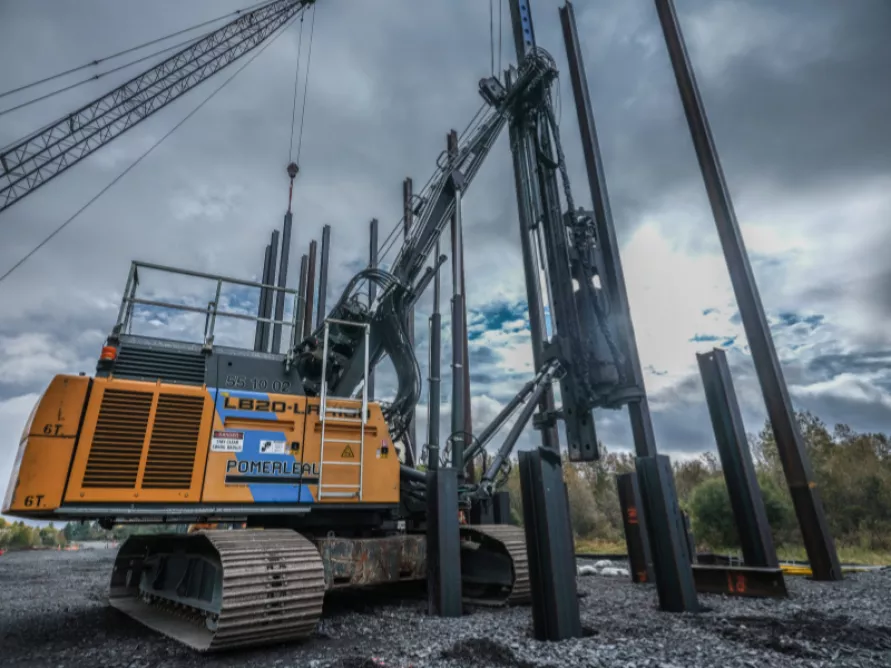
When selecting a deep foundation method, several factors should be considered to ensure the most suitable and cost-effective solution:
Soil Conditions: The type and stability of the soil play a crucial role in determining the appropriate foundation method. Soil tests and geotechnical investigations are essential to assess the soil's bearing capacity and other properties.
Load Requirements: The weight and type of loads the foundation needs to support will influence the choice of foundation. Heavy structures may require deeper and more robust foundations.
Environmental Conditions: Factors such as water table levels, seismic activity, and environmental impact should be considered when choosing a foundation method.
Construction Constraints: Site accessibility, available equipment, and construction timeline can also affect the selection of a deep foundation method.
By understanding the different types of deep foundation solutions and the factors to consider when selecting a method, you can ensure a stable and reliable foundation for your construction projects. At Pomerleau, we leverage our expertise to provide tailored deep foundation solutions that meet your specific needs.
Innovative Deep Foundation Techniques and Technologies
Our deep foundation projects utilize cutting-edge techniques and technologies to ensure superior performance and reliability. Advanced drilling methods such as rotary and auger drilling improve efficiency and accuracy, allowing us to address even the most challenging soil conditions. We conduct real-time monitoring and testing with sensors to ensure foundation integrity, providing immediate feedback, and making adjustments as needed.
Furthermore, we prioritize sustainable practices, using eco-friendly materials and methods to minimize environmental impact. This includes recycling construction waste, reducing carbon emissions, and implementing energy-efficient processes. Pomerleau is at the forefront of innovation, ensuring every project is top-notch and environmentally friendly, delivering lasting value to our clients and the environment.
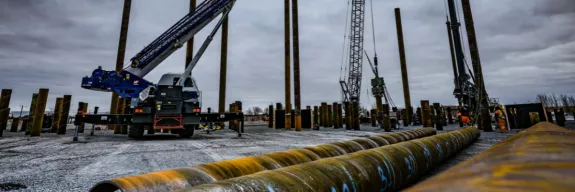
Comprehensive Heavy Equipment Inventory for Construction Projects
Our logistics and procurement department has a warehouse containing nearly 1,000 pieces of available equipment. Some of the main equipment we stock include: crawler drills, double-wall caissons, augers, crawler pile drivers (planters), diesel and hydraulic pile drivers, crawler cranes, and flexifloat barges. We also have mobile cranes, tug and push boats, and temporary bridges designed to support heavy loads. With Pomerleau, you can trust that our state-of-the-art equipment and dedicated support team will help you achieve your project goals without hassle.
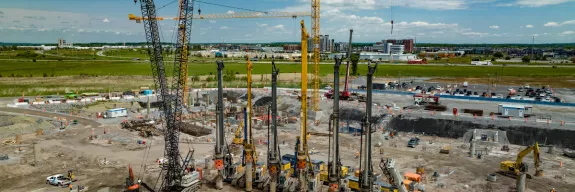
Customer support: from design to execution
Thanks to our expertise in design and execution, we are able to find the most cost-effective and optimal technical solution, while respecting deadlines. Our experience allows us to anticipate and analyze risks at every stage of the project, ensuring the smooth and seamless execution of your construction project.
Discover our flagship projects to see how Pomerleau's commitment to deep foundation solutions has helped us overcome complex challenges and achieve exceptional results. These achievements are a testament to our expertise and our ability to deliver remarkable construction projects.
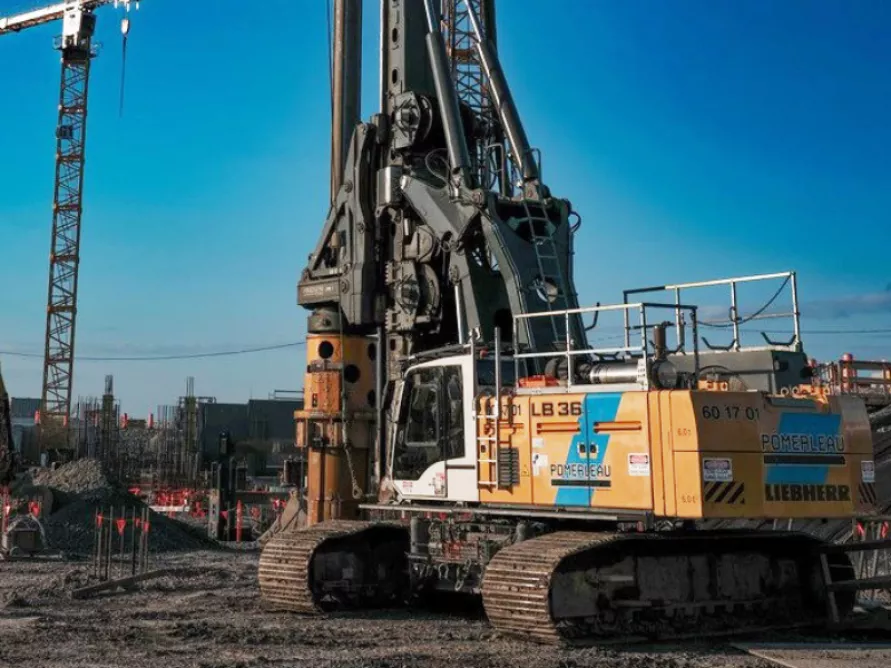
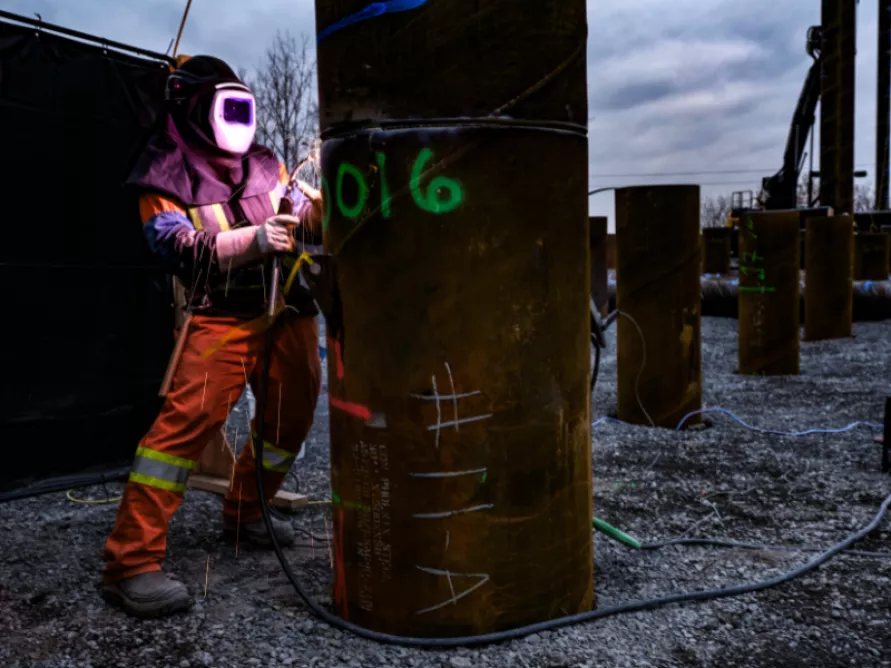
Safety and Compliance in Deep Foundation Projects
The health and safety of our workers, partners, and the public are our priority. Pomerleau's program is based on clear procedures and risk analyses before each project, with a Health and Safety Coordinator for regular inspections. We are nationally recognized, with a CORMc certificate, a personalized assessment rate from the CNESST in Quebec, and we are members in good standing of the ContractorCheck program. In our deep foundation projects, we adhere to strict standards and implement robust safety protocols to protect the environment and workers. By fostering a culture of safety, we minimize risks and ensure a safe work environment. Pomerleau's dedication to safety and compliance makes us a trusted leader in the industry, always putting people and quality first.
A Construction Company with Expertise in Deep Foundation Solutions
With many years of experience, our construction company excels in delivering high-performance deep foundation solutions for a variety of construction projects. We are dedicated to more than just exceptional results; we build with a purpose, making a positive impact and being socially responsible throughout the process.
